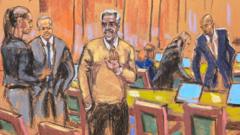After a seven-week trial filled with witness testimonies, Sean "Diddy" Combs' defense concluded its case Tuesday, arguing the prosecution failed to substantiate its claims against him. Combs, who is facing serious charges, declined to testify and aimed to illustrate that his ex-girlfriends were consenting participants in their relationships.
Sean 'Diddy' Combs' Defense Concludes Brief Case After Weeks of Prosecution

Sean 'Diddy' Combs' Defense Concludes Brief Case After Weeks of Prosecution
Sean Combs' legal team wrapped up its case in a sex trafficking trial in a mere 20 minutes, following extensive prosecution efforts.
In a surprising turn of events, Sean "Diddy" Combs' defense attorneys concluded their case within just 20 minutes on Tuesday, marking a significant moment in the ongoing sex trafficking trial against the music mogul. Their succinct presentation followed a lengthy period of nearly seven weeks during which federal prosecutors detailed their allegations against Combs in a New York courtroom.
The prosecution has worked diligently, presenting over 30 witnesses to substantiate their claims that Combs misused his celebrity status and economic power to create a criminal enterprise focused on sex trafficking women. Combs, who has pleaded not guilty to charges of sex trafficking, racketeering, and transportation for prostitution, faces the possibility of life imprisonment if convicted.
In a notable decision, Combs opted not to take the stand in his own defense. He communicated to the court, “It’s my decision with my lawyers” regarding his choice to abstain from testifying, as he maintained his vehement denial of all charges against him. During a rare moment when he addressed the court directly, Combs described his experience in the legal proceedings as "excellent," expressing gratitude to Judge Arun Subramanian.
The defense's strategy involved presenting evidence such as text messages exchanged between Combs and his ex-girlfriends, including singer Casandra Ventura and a victim identified only as Jane. The defense argued that the messages indicated willingness and enthusiastic engagement in sexual encounters known as "freak-offs", which they implied were consensual.
Legal experts, such as New York-based attorney Mitchell Epner, weighed in on the defensive decisions, explaining the complex implications of calling witnesses that could pose risks to their case. Instead of calling witnesses, Combs' lawyers focused on a rapid presentation aimed at undermining the prosecution's narrative. In her statements, defense attorney Alexandra Shapiro asserted that the purported victims had the ability to leave the situation voluntarily, adding, “regrettably violent, but domestic violence is not sex trafficking.”
As the trial progresses toward closing arguments set for later this week, observers remain eager to see how the jury will interpret the contrasting evidence presented by both sides amidst the sensational nature of the case.




















